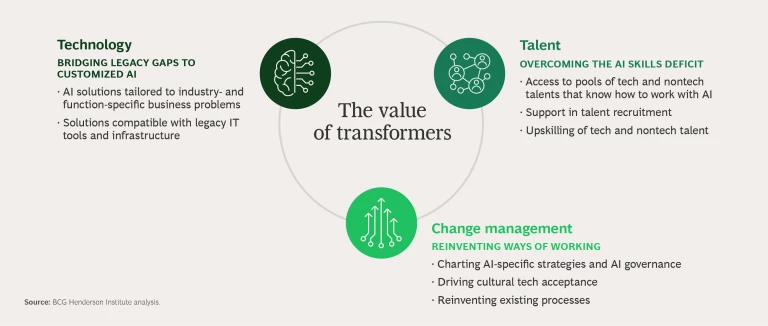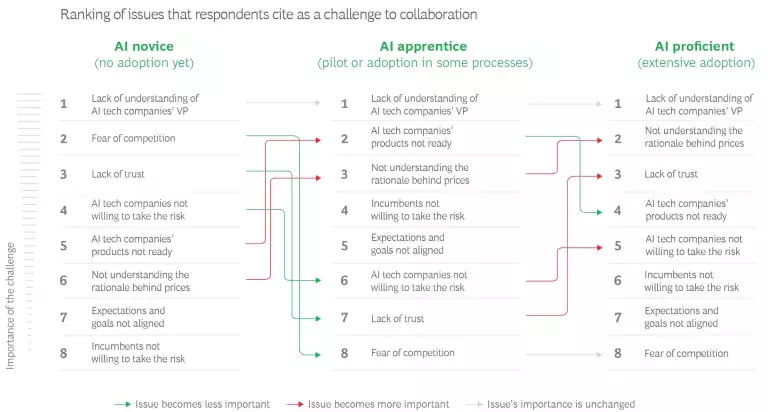Are incumbent companies getting the most out of the AI revolution? Not yet. In a recent analysis, we found that the AI adoption experience among incumbents has been uneven. Now more than ever, organizations are looking to AI technology to solve their unique business challenges and are seeking external tech partners to source AI solutions. But it is no simple matter for incumbents to go beyond off-the-shelf products and foster meaningful collaborations that create tailored solutions to maximize what AI players have to offer.
To better understand incumbents’ AI adoption experiences, BCG and the BCG Henderson Institute surveyed 600 business leaders at the heart of decision making on technology adoption across six markets: China, France, Germany, India, the UK, and the US. The survey spanned 20 industries, excluding the tech sector, where familiarity with AI among incumbents is already high.

Stay ahead with BCG insights on artificial intelligence
The Benefits of Collaboration
Meaningful collaborations can help incumbents resolve key issues that slow their AI adoption:
- Technology: Bridging Legacy Gaps to Customized AI. Whether an incumbent chooses to develop AI solutions in-house or tailor existing solutions on its own to meet its needs, complications in the process of adopting the technology can be a major impediment to the organization’s transformation effort. In our survey, three-quarters of incumbents said that finding available tools internally to build AI was at least a moderately challenging aspect of their organization’s AI adoption efforts.
- Talent: Overcoming the AI Skills Deficit. When it comes to incorporating new AI technology, incumbents must overcome a talent and skills deficit. Our survey found that incumbents almost universally face challenges in sourcing tech talent (reported by 83% of respondents as at least moderately challenging) to meet the requirements of working with new AI.
- Change Management: Reinventing Ways of Working. Incorporating AI technology into an incumbent’s existing operations and processes is a fraught endeavor (83% say that it is at least moderately challenging). But incumbents can smooth the process by charting AI-specific strategies, reimagining existing processes, and establishing AI governance.
What Are Transformers?
Transformers are AI players, typically AI startups and scale-ups, that collaborate—rather than compete—with incumbents to eliminate the above barriers. They offer holistic AI support such as access to custom technology, suitable talent, training, and change management, and they prompt the incumbent to overhaul its processes.

Forging collaborations isn’t easy for incumbents. Navigating an unfamiliar AI marketplace poses challenges to new entrants—and once incumbents have selected an AI partner, they must overcome numerous roadblocks, depending on their AI maturity level.

In the early stages of their AI transformation, incumbents tend to be apprehensive about working with AI startups or scale-ups. Although that uneasiness typically fades as they gain AI experience, other obstacles become more significant. In particular, more experienced incumbents often develop a preference for mature AI products over experimentation and tailored solutions. And when incumbents reach the more advanced stages of their transformation and begin to deploy AI at scale, they face new issues related to the pricing of AI products and the distribution of value in the partnership.
To overcome these challenges, incumbents must recognize and change preconceived notions and ingrained behaviors. In part, this effort will require shifts in mindset. Incumbents may initially view AI startups and their methods with fear, mistrust, and resistance, but they need to embrace collaboration and experimentation. Incumbents must also negotiate several key tradeoffs in areas such as proprietary data, IP ownership, and partnerships.
The Case for Finding Your Transformer
Our study of top incumbent decision makers reveals the enormous benefits that incumbents can reap when they collaborate with transformers to unlock the power of AI technology. Yet fostering such collaborations require sustained attention to emerging challenges. Although these change as incumbents advance through each stage of adoption, the hurdles they pose are surmountable—and the payoff in value is clear.



